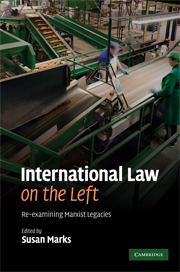Book contents
- Frontmatter
- Contents
- Contributors
- Acknowledgements
- Introduction
- 1 What should international lawyers learn from Karl Marx?
- 2 An outline of a Marxist course on public international law
- 3 The commodity-form theory of international law
- 4 Positivism versus self-determination: the contradictions of Soviet international law
- 5 Marxism and international law: perspectives for the American (twenty-first) century?
- 6 Toward a radical political economy critique of transnational economic law
- 7 Marxian insights for the human rights project
- 8 Marxian embraces (and de-couplings) in Upendra Baxi's human rights scholarship: a case study
- 9 Exploitation as an international legal concept
- Index
8 - Marxian embraces (and de-couplings) in Upendra Baxi's human rights scholarship: a case study
Published online by Cambridge University Press: 07 September 2009
- Frontmatter
- Contents
- Contributors
- Acknowledgements
- Introduction
- 1 What should international lawyers learn from Karl Marx?
- 2 An outline of a Marxist course on public international law
- 3 The commodity-form theory of international law
- 4 Positivism versus self-determination: the contradictions of Soviet international law
- 5 Marxism and international law: perspectives for the American (twenty-first) century?
- 6 Toward a radical political economy critique of transnational economic law
- 7 Marxian insights for the human rights project
- 8 Marxian embraces (and de-couplings) in Upendra Baxi's human rights scholarship: a case study
- 9 Exploitation as an international legal concept
- Index
Summary
Introduction
For a remarkably long period of time, the world over, Marxist ideas ‘held a special fascination for movements seeking to transform economic, political, and social conditions in favour of the “have-nots”’. But the not-too-distant fall of what was widely regarded as ‘actually existing socialism’ has led all too many commentators to declare (with varying degrees of thoughtfulness or the lack thereof) that the Marxian thought that seemed to inspire and animate that system had ‘thus been rendered nugatory’. Yet, there is increasing recognition among an epistemic community of those knowledgeable in the intricacies of Marxian and other socio-political thought that these sorts of announcements of the complete and total negation of the broadly Marxian theory of social, political and economic life are far too non-nuanced and totalising as to be accurate. Some, like Brad Roth and Martti Koskenniemi, have even gone as far as arguing (in separate papers) that Marx can even be retrieved to further the ends of either the human rights movement or of international law more generally.
It is in this broad tradition of critical reflection on the continued (however limited) influence of Marxian thought on social scientific and international legal scholarship that this chapter is conceived.
- Type
- Chapter
- Information
- International Law on the LeftRe-examining Marxist Legacies, pp. 252 - 280Publisher: Cambridge University PressPrint publication year: 2008

